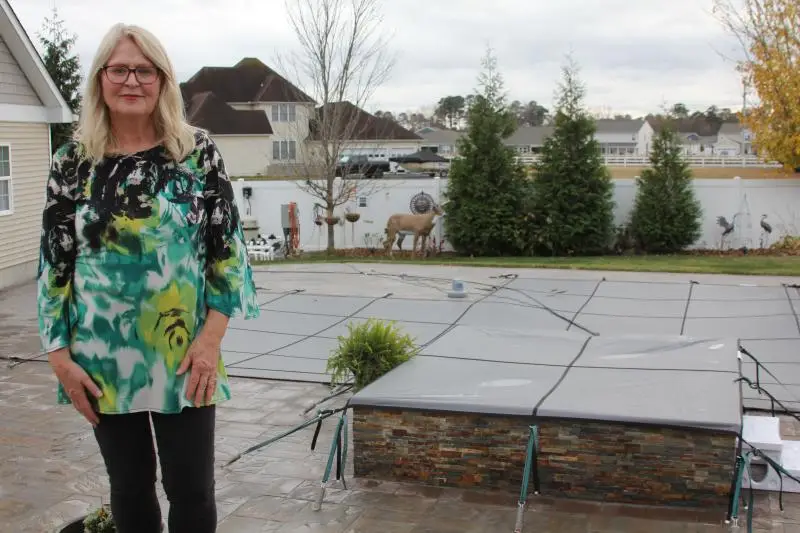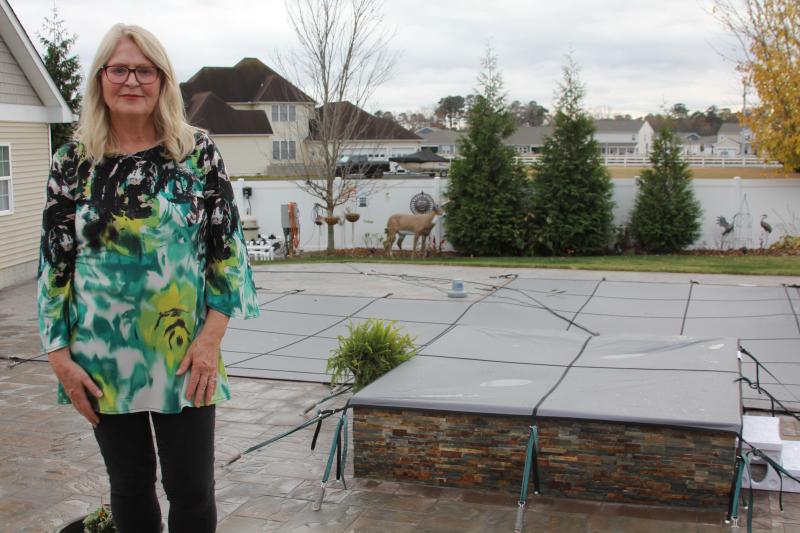-
 play_arrow
play_arrow
Radio Rehoboth
Bill Frankis just wanted a pool. When he was diagnosed with multiple sclerosis, his doctor had recommended it for therapy.
But $131,000 later, all he had to show was a partially tiled hole in the ground. The contractor packed up all the remaining equipment Frankis had paid for, left, and never came back.
“I’ll never give up on this. This guy really screwed me,” Frankis said. “If I can save one person from going through what he’s done to me, it’ll be worth it.”
Frankis is just one of many Sussex County residents who have been taken by home improvement fraudsters.
These contractors often file bankruptcy and quickly reopen for business under a new name.
Ocean View contractor Jeremy Bowen, 45, was arrested June 28 and charged with felony home improvement fraud over $1,500 because the victim was 62 or older. It’s the same charge Bowen was given March 13, after a 72-year-old man said he paid Bowen $43,000 to build a pool, but no work was done.
In July, detectives began investigating two of Bowen’s businesses, Delmarva Landscaping Solutions LLC and Shoreline Escapes LLC, and charged him with more home improvement fraud – two counts of felony home improvement fraud over $1,500, felony home improvement fraud over $1,500 where the victim is over 62, felony theft by false pretense over $1,500, and felony theft over $1,500. Bowen was arraigned by Justice of the Peace Court 2, and released on $8,000 secured bond and $3,000 cash bond.
Lewes police said Bowen has been arrested and charged with fraud eight times since 2017.
The ease these contractors have in continuing to do business is perplexing to the victims. The loss of money is palpable.
The Cape Gazette talked to several victims at various stages in the court process as they seek compensation. Though they are glad charges have finally been filed, many say they don’t expect to recoup a dime, and they would like tighter regulation of the home improvement industry.
Bankruptcy filings
Michelle Watson, 58, of Harbeson hired contractor Frank Stiles to build a pool, paying him $79,500 for a job that he never completed.
“The pool drainage is off. We never got the handrail, cover, electric or equipment. He put in just the shell and then stopped,” she said.
So far, Watson said, it has cost her another $68,000 for the job, which is not yet complete.
Watson is part of a crew of people who say Stiles ripped them off for more than $1.5 million in home improvement fraud. Stiles now faces seven counts of theft where property value is $100,000 or more, four counts theft where property value is $50,000 to $100,000, theft $1,500 or more where the victim is 62 or older, four counts theft by false pretense over $1,500, seven counts home improvement fraud of $100,000 or more, six counts home improvement fraud of $50,000 to $100,000, home improvement fraud where the victim is 62 or older, two counts home improvement fraud by false pretense over $1,500, two counts home improvement fraud over $1,500, and two counts issuing a bad check equal or over $1,500. He was released Oct. 7 on $187,500 unsecured bond.
Stiles has filed for bankruptcy in U.S. Bankruptcy Court, which has a deadline of Jan. 2, 2025, for claims to be filed.
Watson said she has filed a claim against Stiles, but is not expecting any payback.
“Honestly, I don’t think I’ll get a dime,” she said.
Billboard threat
Shelley Sarsfield, 74, who has a home in Angola Beach, was so frustrated with her contractor, Christopher Russell, that she threatened to take out a billboard on Route 1.
“There were times that I called him three or four times a day, and he never got back to me,” she said.
Sarsfield said she signed a contract with Russell in December 2023, paying him $27,000 for a $30,000 sunroom that he never completed. She ended up paying another $21,000 to finish the room.
“I’m surprised you didn’t hear me screaming,” she said.
Working with the Attorney General’s Office, Sarsfield said she gave them a string of text messages that she had kept from Russell, 47, of Milton, owner of Great Outdoors Sunrooms and Shade Solutions. In October, he was charged after police say he signed contracts with five people in Kent and Sussex counties and received more than $118,000 in payments, but never completed or began the projects.
He is now out on $23,000 unsecured bond and charges of home improvement fraud value $50,000 to $100,000; home improvement fraud $1,500 or more; home improvement fraud by false pretense $1,500 or more; two counts home improvement fraud by false pretense $1,500 or more, victim is over 62; two counts theft over $1,500, victim is over 62; two counts theft over $1,500; and theft by false pretense over $1,500.
Sarsfield said Russell has a long list of civil suits filed against him already, and she doubts she’ll ever recoup what she spent. “I’ll never see the money. I’m probably last in line,” she said.
Therapy pool turns cold
Frankis, 54, had been diagnosed with multiple sclerosis when he decided to take his doctor’s advice and build a pool.
He signed a contract in August 2023 with a Maryland contractor, who unbeknownst to Frankis, had already filed for bankruptcy. “Never did he mention that to me,” Frankis said. “I never would’ve signed it if I had known. He had a responsibility to tell me that – it’s fraud.”
Frankis said he paid $131,000 for the contractor to dig a hole, do subpar tile work, and deliver some equipment, which Frankis said the contractor later came back and took.
After parting ways with the contractor, Frankis said he ended up paying another $70,000 to finish the pool, $30,000 for tile work, and $15,000 for a fence. Frankis said he had to pay another $5,000 for his irrigation system that was damaged.
Since then, Frankis said he has been bounced around from state police to the Attorney General’s Office and told that his situation is a civil matter. After hiring a local attorney, he said, he has been told that he needs to hire a Maryland attorney.
“Everybody’s pointing at each other, and they keep saying it’s civil,” Frankis said.
Attorney General’s Office spokesperson Caroline Harrison said there are a lot of elements to consider when home improvement fraud cases reach their office, and a number of avenues for cases to reach the Department of Justice.
“If a consumer files a complaint with our Consumer Mediation Unit, our team will try to help the consumer through informal, nonbinding mediation,” she said. “In a small handful of cases where our team identifies that there appears to be a pattern and practice of misconduct by a home improvement contractor, they may refer it to our enforcement team in the Consumer Protection Team for possible investigation.”
Harrison said a homeowner can always hire their own attorney in cases of breach of contract, and if deception is involved, violations of the Consumer Fraud Act. If the consumer is over 65 or disabled, she said, a victim may be able to recover attorneys’ fees.
“It is always difficult for us to tell consumers that their only option is to hire an attorney, which often feels like throwing good money after bad,” Harrison said. “But with limited resources to enforce over three dozen consumer protection statutes, we are limited in what cases we pursue.”
Harrison said the department receives thousands of consumer complaints a year for a staff that includes five deputy attorneys general to cover the caseload for the Consumer Protection Unit.
The DOJ’s White Collar Crime Unit has two deputy attorneys general and one investigator to take on cases after a police agency has investigated a police report filed by a homeowner.
“But only a small number of cases meet the standard of criminal prosecution,” Harrison said. “Among those that do, it is very difficult to meet the burden of proof, which is significantly higher than that of civil cases.”
In those cases, Harrison said, prosecutors must prove a “theft state of mind” or that the defendant willfully and intentionally sought to commit theft, per the Home Improvement Fraud statute.
“Not getting what the customer expected after providing a contractor with payment, even in what seems like a large amount, is not sufficient evidence without addressing the context,” she said.
For example, she said, work delays or stoppage must be investigated to rule out supply-chain constraints, worker illness or injury, complications due to weather, or backlogs in permitting processes.
“[These] undermine our ability to prove state of mind of theft beyond a reasonable doubt,” she said.
Additionally, she said, customers unhappy with the quality of work provided have to pursue a case civilly, since quality-control disputes are not criminal.
Complications also stem from informal home improvement transactions that involve bare-bones contracts, she said, and are often verbal agreements with nothing in a contract. Many contractors are one-man operations skilled in contracting duties, but that do a poor job of handling business affairs, she said. “Bad business practices are a frequent problem, but one that needs redress in the civil courts, not through criminal prosecution,” Harrison said.
“Given the considerable obstacles, addressing repeat offenders is a focus, because multiple incidents often provide a sufficient record from which investigators can determine whether the evidence satisfies a criminal burden,” she said.
Betty Barney of Millsboro is one of 40 people who said they were taken advantage of by Stiles. She paid $97,000 for landscaping and a deck, and ended up having to pay $150,000 to finish everything that Stiles left. She and her husband have filed for compensation under Stiles’ bankruptcy case. Barney said an investigator told her claims against Stiles are now more than $4 million.
She was thrilled when Stiles was finally arrested, and she vowed to push for stricter laws in Delaware. “There are more companies like this,” she said. “There are such sad cases of people who have retired here who have been taken for everything they have.”
Harrison said the DOJ supports legislative efforts to address home improvement fraud, both civil and criminal.
House Bill 427, introduced last session by Rep. Eric Morrison, D-Glasgow, and sponsored in the Senate by Sen. Russ Huxtable, D-Lewes, sought to regulate home improvement contracts. The bill never cleared a House committee, but it would have debarred a person convicted of two or more offenses of home improvement fraud, in addition to giving consumers the right to cancel a contract, limit deposits and set a time frame for construction to begin.
“Many challenges with pursuing home improvement fraud, both civilly and criminally, were sought to be addressed by last session’s HB 427, introduced by Rep. Morrison, which we were disappointed to see not clear committee,” Harrison said.
Huxtable said home improvement fraud is an issue that needs to be addressed.
“I know for myself, I’ll continue to work with folks to address home improvement fraud,” he said. “It’s a shame that folks can be taken advantage of and remedy is hard to come by, and others can also be taken advantage of by the same folks.”
Go to Source:https://www.capegazette.com/article/home-improvement-scams-plague-region/284248
Author: Melissa Steele
Written by: RSS
Similar posts
-

Daybreak Morning Show
Hosted by Jeff Balk
Join Jeff Balk for all the news and information you need to know to start your day and enjoy your stay in Rehoboth Beach, Dewey Beach and the Lewes areas with special featured guests from our non-profits, businesses and art communities.
close Chart
Top popular

News Briefs 10/17/23
Board of Commissioners Workshop & Special Meeting – November 6

Six Sussex road projects considered in latest CTP
NFL Week 17 highlights: Packers, 49ers, Saints, Steelers win, Cardinals stun Eagles
Knicks vs. Cavaliers prediction, odds, line, spread, time: 2023 NBA picks, Nov. 1 best bets from proven model
Copyright 2023 East Sussex Public Broadcasting, Inc.






